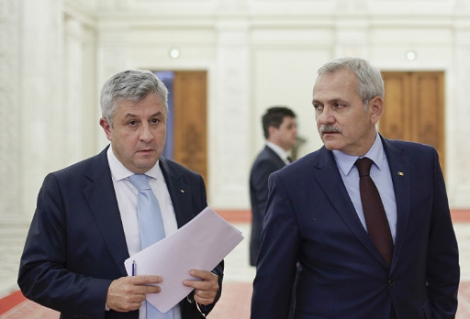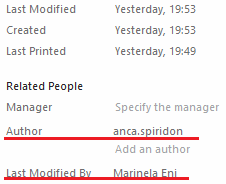 After solving the wage increases and amending the Tax Code, the parliamentary majority started the second week of exercising the governance: amending the criminal legislation, especially that part relating to the situation of prosecuted and convicted people.
After solving the wage increases and amending the Tax Code, the parliamentary majority started the second week of exercising the governance: amending the criminal legislation, especially that part relating to the situation of prosecuted and convicted people.
The government draft ordinances on granting pardon and amending the criminal codes seem „tailor-made” like – at the client’s request and using client’s material.
Much of the provisions of the two bills published on Wednesday on the Ministry of Justice’s website seem created to be all about some politicians already condemned and for some of those under criminal investigations and proceedings.
Very important detail: Besides, the author of the bill on pardon, as displayed in the document metadata, is someone from Mr Liviu Dragnea’s cabinet from the Chamber of Deputies. And Mr Dragnea’s status would benefit, in an advantageous manner, from both bills.
The summary below tries to cover – by a 360-degree approach four aspects:
1: What the emergency ordinance bills that radically alter the justice approach actually provide – the beneficiaries of the pardon and the amnesty concealed with the decriminalization of certain acts
2: The procedural problems that the rush of the Government might raise
3: The reaction of the justice system
4: The constitutionality related problems of these documents
Despite the statements made by the Minister of Justice – Florin Iordache, and Prime Minister Sorin Grindeanu, two emergency ordinances were to be approved in the government meeting on Wednesday: Ordinance on granting pardon for certain sentences and Emergency Ordinance amending and supplementing the Criminal Code and Code of Criminal Procedure.
Excerpts from the Ordinance on granting pardon – from going back home to the exemption from recovering the damages
The emergency ordinance fully grants pardon for prison sentences of up to five years (inclusively), as well as the fine penalties imposed by the court, this provision being applied irrespective of the type of the penalty execution.
Perpetrators of serious offenses, listed among penalties of under five years, should not have benefited by pardon.
Very important: the ordinance also contains a partial pardon, without specifying any penalty range for that.
It only mentions that granting this type of pardon is possible for:
- persons who have reached 60 years of age
- pregnant women
- people with dependent minors under 5 years of age
- persons diagnosed with incurable terminal stage illnesses by a forensic examination of authorized institutions
Dangerous criminals such as rapists, paedophiles, thieves and even murderers can be classified might also fall into this category.
Exemptions (with dedication) from damages recovery
Another big problem related to pardon is about recovering the damages. The partially pardoned people would escape from paying the damages caused by their offense.
Although the ordinance mentions, at one point, that „the pardon is conditional upon the payment of the compensation to which the convicted persons were obliged by the final court order, within one year of their release”, the bill mentions, a few lines below, that this provision does not apply to partially pardoned convicts, namely those in one of the following situations:
- 1/2 prison sentences imposed on people who have reached 60 years of age, pregnant women or people with dependent minors under 5 years of age;
- 1/2 or, where appropriate, the remaining unexecuted punishment of prison sentences imposed on persons who, by forensic examination of authorized institutions are diagnosed with incurable terminal stage illnesses
Dan Voiculescu is over 60 years old and will benefit of both advantages of this „partial pardon”:
- He may be released earlier, although the penalty in the ICA case file is of 10 years, bigger than the general limit of 5 years
- Escapes from paying the compensation for the damage
Pardon granted to convicts with suspended sentences and its purpose
The ordinance includes, though, a provision that has no relation to the overcrowded prisons issue, invoked by the Government, which does not exist in any other previous law on pardon, but could help Liviu Dragnea, for instance, in his suspended sentence from the Referendum file.
According to the bill, people convicted with suspended sentences can also be granted a pardon – „The pardon also has effects on conditionally suspended penalties, in this situation the part of the probation period representing the penalty length imposed by the court is reduced accordingly. If the conditional suspension is revoked or annulled, it is served only the penalty remained unpardoned”.
It means that Liviu Dragnea may become prime minister this spring, as it is considered that he completed his 4-year probation and his criminal record is „cleaned” this way.
Concrete beneficiaries of this form of pardon:
Among those who will benefit from pardon granting – some following certain convictions and others by pardon for certain acts – there will be politicians convicted or under current criminal investigations:
- Liviu Dragnea – Referendum file
- Dan Voiculescu – including the cancellation of the damage compensation payment
- Călin Popescu Tariceanu (perjury file)
- Nicusor Constantinescu
- Monica Ridzi
- Adrian Severin
- Calin Popescu Tariceanu – if convicted in the pending case, he will automatically be pardoned
Author of the bill on pardon – in the computer at Liviu Dragnea’s cabinet from the Chamber of Deputies
The metadata attached to the bill on pardon contain a detail that reinforces the perception of a targeted regulatory act.
 While all three documents from the legislation package (the explanatory memorandum to the pardon, the draft and explanatory memorandum of the ordinance amending the codes) include a name signature of an official from the Ministry of Justice, the bill text on pardon mention „anca.spiridon” as the author.
While all three documents from the legislation package (the explanatory memorandum to the pardon, the draft and explanatory memorandum of the ordinance amending the codes) include a name signature of an official from the Ministry of Justice, the bill text on pardon mention „anca.spiridon” as the author.
There is no employee by that name at the Ministry of Justice and the only state employee in Romania having this name and a declaration of assets who might be part of the official process of drafting this act is Anca Mihaela Spiridon, general manager at the Chancellery of the President of the Chamber of Deputies.
The „first name.last name” signature format is specific for the Word documents written on computers from the Chamber of Deputies. The signatures from the Ministry of Justice have the format „First name.Last name”.
Asked about whether the document circulated through her computer, Anca Spiridon denied and said that she knows nothing.
The document metadata also contain the name of an official from the Ministry of Justice, but in the Last Modified cell – ” Marinela Eni” is Secretarial Agent at the Public Management and Strategic Planning Unit.
According to the Microsoft guidelines, whenever a new document is created, Word program automatically adds the user name as the author’s name at the document properties.
Phase two: Concealed amnesty behind the decriminalization of corruption acts currently investigated or before the courts
With the pretext of integrating the Constitutional Court decisions into the criminal codes, the second emergency ordinance provides for a decriminalization of several corruption acts:
-
a) Neglect of duty disappears, as Art. 298 of the Criminal Law would be repealed
-
b) Abuse of office: damages of less than 50,000 euros are no longer considered offenses
How the article would look:
„The offence committed by a civil servant who, while on duty, does not fulfil an act or commit an illegal act and thereby causing a material damage exceeding 200,000 lei to a natural or a legal person shall be punished by imprisonment for 6 months to 3 years or a fine. Criminal proceedings shall be initiated upon the complaint of the injured party”
Consequences:
- It is introduced the provision that the offense is to be investigated upon the complaint of the injured person, which makes prosecution impossible if the victim is deceased, for example
- The person would be investigated only in the case of a damage exceeding 200,000 lei, a very high threshold, given that there are municipalities, for example, where total investment from the budget forecast does not reach one million lei. Because of this threshold, Liviu Dragnea would escape, for example, in the Bombonica file (where the damage is 108,000 lei).
- Those who execute the abuse of office penalty for damages under 200,000 lei will be released
- The maximum penalty for any liable person who commits this crime would be reduced from seven to three years. It means that many people prosecuted for abuse of office will escape from conviction because the limitation period would automatically be reduced (with reduction of the sentence)
-
c) Conflict of interest
How it will look:
The offense of a civil servant who, „in the line of duty, committed an act or participated in a decision through which he obtained, directly or indirectly, unfair patrimonial advantages for himself, the spouse, a relative or a marriage up to the second degree included, is punishable„.
Consequences:
The introduction of the „unfair” term makes the law very permissive.
-
d) Denunciation (mentioned in the Code of Criminal Procedure)
Amendment:
A deadline is introduced: denunciation must be submitted „to the competent prosecuting authority within 6 months from the date of committing the offense referred to in the criminal law, with the sanction of annulling its legal consequences provided by law which result in removal of criminal liability.”
Consequences:
Any offense reported after more than half a year since committing will have no legal value, which means that more than 50% of the DNA case files disappear.
Denunciations are very important in the influence peddling and bribery cases, as most of the cases investigated by DNA started with a denunciation: cases of Elena Udrea, Sorin Blejnar, Microsoft 2, cases against Bogdan Olteanu, Dan Sova, etc.
Politicians discharged because of decriminalization:
- Liviu Dragnea – in the abuse case, the so-called „Bombonica File”
- Titus Corlatean (abuse of office for the diaspora vote in the 2014 presidential election)
- Gabriel Oprea
- Nicusor Constantinescu
- Marian Vanghelie
- Elena Udrea (Bute Gala)
- Sorin Blejnar
- Vasile Blaga
- Bogdan Olteanu
- Ministers’ from the “Microsoft Case”
- Many, many others from the country
A pardon cannot be granted by emergency ordinance
According to Judge Cristi Danilet, former CSM member, the Government’s approach is unconstitutional from the start, as under art.73 para.3 of the Constitution of Romania, a collective pardon may be ordered by an organic law. On this matter, neither government ordinances can be issued, provides art. 115 Constitution.
Besides, there is a framework law on pardon Law 546/2002 stipulates very clearly:
Art.2
Pardon may be granted individually by a decree of the President of Romania, according to art. 94 letter d) of the Constitution of Romania, or collectively, by the Parliament, by an organic law, according to art. 72 para. (3) letter g) of the Constitution.
Big irregularities in the ordinance on pardon
The ordinance on pardon also contains several other serious substantive irregularities, such as granting pardon for acts, the same as it is done in fact by the amnesty laws, and not punishments, as Law 546/2002 also stipulates.
Overcrowding is not solved
Grindeanu government claims that the purpose of a pardon is to decongestion the prisons, but in a statement made on Wednesday Minister Florin Iordache told that only 2,500 people would be released from prison. According to statistics, the real capacity of prisons is exceeded by about 8,000 people. Besides, many of those to be released would reoffend within the first year after release, as again the statistics of the Romanian Administration of Penitentiaries show – the usual share is about 50%, which mean that the overcrowding would be again about at the same level by the end of the year.









